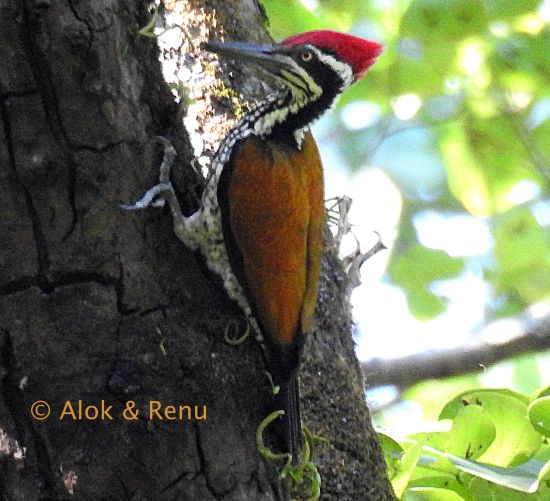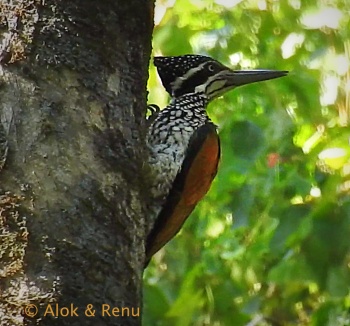Alternative names: Greater Goldenback; Greater Flame-backed Woodpecker

Photo © by Alok Tewari
Sat Tal Forest, Alt. 5500 ft., Nainital, Uttarakhand Himalayas, India, 19 October 2018
- Chrysocolaptes guttacristatus
Identification
Size-33cm
- Crest red in male, black with white spots in female
- Side of head white with prominent black stripe through eye continuing down neck, and a second narrow black stripe below
- Nape and wing coverts golden brown to golden yellow depending on light
- Flight feathers blackish with white bars
- Lower back and rump red
- Tail black
- Underside white scalloped blackish
Similar Species
From Common Flameback by large size, largely white hindneck with black sides of neck, yellow iris, longer and more robust bill and thin black malar stripes separated by small white patch. Crest more shaggy and less pointed.
From the formerly conspecific Malabar Flameback mostly on non-overlapping range and voice differences.
Distribution
Indian subcontinent (except western edge) through southeast Asia to Sumatra, parts of Java and Borneo.

Photo © by Alok Tewari
Sat Tal Forest, Alt. 5500 ft., Nainital, Uttarakhand Himalayas, India, 19 October 2018
Taxonomy
Luzon Flameback, Yellow-faced Flameback, Red-headed Flameback, Javan Flameback, Buff-spotted Flameback (keeping the old scientific name lucidus), Crimson-backed Flameback and Malabar Flameback were formerly included in this species.
Subspecies
Clements recognizes these subspecies[1]:
- C. g. sultaneus: Himalayas foothills in northwestern India and western Nepal
- C. g. guttacristatus: foothills in east central Nepal east to southern China (Yunnan) and south to Bangladesh, eastern India (south to southeastern Madhya Pradesh and northern Andhra Pradesh), Thailand and Indochina
- C. g. indomalayicus: peninsular Malaysia, Sumatra and west and central Java
- C. g. andrewsi: northeast Borneo
Habitat
Forests including both evergreen and broad-leaved forest, old plantations, riparian areas and mangrove. Some large trees including dead trees are necessary.
Behaviour
Frequents the canopy and middle story. Usually in small noisy groups up to ten, even at nest. Sometimes solitary.
Searching for food includes both hammering and probing, as well as more rarely hawking for flying, swarming insects.
Vocalisation
A distinct series of sharp notes, di-di-di-di-di-di-.. reminiscent of large cicada.
Flight call similar to to Common Flameback.
Recording by Alok Tewari
Sat Tal, Alt 5500 ft., Uttarakhand Himalayas, India, April-2017
Inflight call in late evening. There is initial, brief overlap call by a Great Barbet.
References
- Clements, J. F., P. C. Rasmussen, T. S. Schulenberg, M. J. Iliff, T. A. Fredericks, J. A. Gerbracht, D. Lepage, A. Spencer, S. M. Billerman, B. L. Sullivan, and C. L. Wood. 2023. The eBird/Clements checklist of Birds of the World: v2023. Downloaded from https://www.birds.cornell.edu/clementschecklist/download/
- Gill, F, D Donsker, and P Rasmussen (Eds). 2023. IOC World Bird List (v 13.2). Doi 10.14344/IOC.ML.13.2. http://www.worldbirdnames.org/
- del Hoyo, J., N. Collar, D. A. Christie, P. F. D. Boesman, and C. Hansasuta (2023). Greater Flameback (Chrysocolaptes guttacristatus), version 1.2. In Birds of the World (N. D. Sly, Editor). Cornell Lab of Ornithology, Ithaca, NY, USA. https://doi.org/10.2173/bow.grefla1.01.2
Recommended Citation
- BirdForum Opus contributors. (2024) Greater Flameback. In: BirdForum, the forum for wild birds and birding. Retrieved 22 December 2024 from https://www.birdforum.net/opus/Greater_Flameback
External Links
GSearch checked for 2020 platform.1




